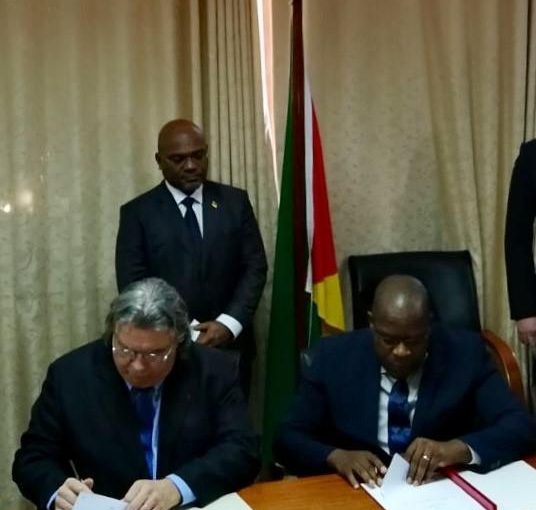Mozambique: Credit to economy falls 2% in June
More on agreement on coastal shipping signed in Mozambique – AIM report

Signature of the MOU for Implementation of Cabotage activities in Mozambique between owned state Company Transmaritima rep. by its Executive Chairman Eng. Jafar Ruby and Peschaud Moçambique, rep. by the Executive Chairman of Peschaud Group, Mr Christophe Peschaud, headed by his Excellency the Minister of Transport and Communication, Dr Carlos Mesquita. Photo: Pemba Freight Forwarder CargoFrete Facebook
Coastal shipping may soon revive in Mozambique, thanks to an agreement signed in Maputo on Wednesday by the Mozambican public maritime and river transport company, Transmaritima, and the French group Peschaud.
Signing the agreement were the chairpersons of the two companies, Jafar Ruby of Transmaritima, and Cristophe Peschaud for the Peschaud Group. Transport Minister Carlos Mesquita witnessed the ceremony.
Under the agreement, the French company will place ships in Mozambique to carry goods between the ports along the Mozambican coastline.
“We are very proud at the trust which Transmaritima and the Mozambican authorities have placed in us”, said Peschaud. “We shall put everything in motion so that this operation takes place under the best of conditions. We are aware that it is a national priority for us to work with secondary ports. We think this project comes in time to provide services for the major developments that are going to happen, mainly in the north of the country”.
Peschaud was clearly referring to the development of the natural gas fields in the Rovuma Basin, off the coast of Cabo Delgado province.
For his part, Jafar Ruby said that reviving coastal shipping will be crucial for Mozambique’s development in the coming period. He thought the project should be carried out as quickly as possible, starting with bringing the ships to Mozambique.
“We shall select the most appropriate ships so that they can be acquired for us to be operational by this September”, Ruby added.
Ruby thought it premature to estimate the amount of investment required, but Peschaud said that bringing the ships to Mozambique will cost at least ten million US dollars.
Mesquita was optimistic that the use of coastal shipping will take the pressure off Mozambican roads. If goods are carried by ship rather than by truck, said the minister, transport costs would fall, and this should reduce the price of goods at their destination.
The switch to coastal shipping would also reduce the need for road maintenance and rehabilitation, and cut the number of traffic accidents, he forecast.
If the ships stop regularly at secondary ports, as well as the international ports of Maputo, Beira and Nacala, than producers “will have easier access to potential markets”, said Mesquita.
“This system will stimulate economic development in the various places where the ships will call”, added Mesquita.
“People may have the impression that this process has been very slow”, he said. “But in fact the work has been done in a very detailed way, given the sensitivity of the matter”.











Leave a Reply
Be the First to Comment!
You must be logged in to post a comment.
You must be logged in to post a comment.